Chapter 31 Subordination(1)之名词性从句
Subordination I
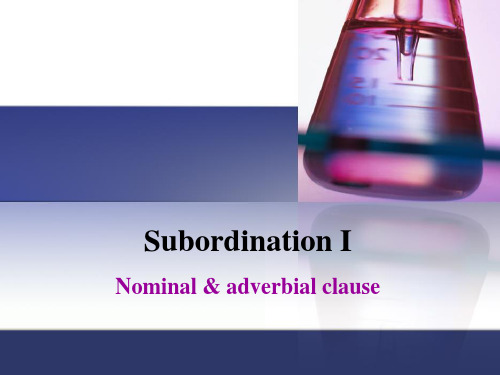
2) 有时将动名词,介词短语或整个从句的否定 转变为对谓语动词的否定。 I don‟t remember having ever seen such a man. It‟s not a place where anyone would expect to see strangers on the street.
同位语:They are investigating the question whether the man is trustworthy. 形容词宾语: She‟s doubtful whether we shall be able to come. 介词宾语: I worry about whether he can pass through the crisis of his illness.
2)选择性疑问从句 选择性疑问从句由关联词if/whether…or或 whethe…or not构成,例如: Please tell me whether / if they are Swedish or Danish. I don't care whether you like the plan or not.
It…that…: collocation
a. It + be +形容词+ that-从句 It is necessary that… It is important that… It is obvious that… b. It + be + -ed 分词+ that-从句 It is believed that… It is known to all that… It has been decided that…
新编英语语法教程lecture31-32_Subordination(I-II)

Lecture 31-32 Subordination
Lecture 31 Subordination (I)
Subordination means putting a grammatical unit in a lower rank or position. A grammatical unit that functions as a constituent of another unit of equal or lower rank of structure is called a subordinate construction, which might be a finite clauses, a nonfinite clause, a verb less, or a phrase.
2) Syntactic functions of infinitive clauses a) As an adverbial of purpose, the infinitive is usually with to. b) To denote result , we normally use the simple form of to infinitive c)As an adverbial of cause,Infinitive clauses generally collocate with adjectives or verbs denoting emotion or fortune
新概念英语第3册语法精粹+课本课后习题答案

新概念第三册语法精粹第一章英语从句Subordination英语从句主要有定语从句,状语从句和名词性从句(主语从句,宾语从句,表语从句,同位语从句)一.定语从句定语从句:由关系代词who, whom, whose, that, which; 关系副词when, where, why 引导。
(下面十个句子请读5遍并脱口译出!)1. The death notices tell us about people who have died during the week.2. The man (whom) you spoke to just now is my friend.3. The building whose lights are on is beautiful.4. Please find a place which we can have a private talk in.5. The knee is the joint where the thighbone meets the large bone of the lower leg.6. He still remembers the day when he went to school.7. It is no need telling us the reason why you didn't finish it in time.8. He has three sons, two of whom died in the war.9. Mr. Smith, whose wife is a clerk, teaches us English.10. In the Sunday paper there are comics, which children enjoy.只能用that和who引导的定语从句A.all, nothing, anything, a few, one做先行词指物时B.先行词前有形容词最高级修饰时,后面常跟that而不是which.C.先行词前有the only, the first, the last, the next, the very等词修饰时,引导词只能用that。
Lecture 31 Subordination 语法教程 课堂

?Nominal clauses( 名词性分句,主 /宾/补/同位) ?Relative clauses( 关系分句,定语从句 ) ?Adverbial clauses( 状语分句,状语 )
has not yet been answered. (appositive)
?You must give it back to whoever it belongs.
(prepositional phrase)
主语从句 the subject clause
? 你所说的话是正确的。 ? What you said is quite true. ? 我们在什么地方做这个实验还在讨论。 ? Where we shall do the test is still under discussion. ? 大家对他怎样完成这项工作的都很感兴趣。 ? How he managed to finish the job is of interest to us all. ? 为什么早晨的太阳看上去比中午的太阳大,这事很有趣。 ? Why the sun in the morning looks bigger than the sun at
deliberately. (subject)
?I can't imagine what made him behave like
that. (object)
?The mystery is whether he ever went there
at all. (subject complement)
名词性从句优秀PPT课件

instructed it to do. (01全国) 3. 中国不再是过去的样子了。
China is no longer __w_h_a_t_ it used to be .
4. A modern city has been set up in ______ was a wasteland ten years ago. (04天津)
3
主语从句一般有三种结构:
1. 主语从句+谓语 That she will win the match is certain.
2.It+be+形容词(名词词组、过去分词)+that从句
It is important that we teens should learn English. It is good news that he will attend the meeting on behalf of our school.
Grammar and usage ---Noun Clauses 名词性从句
1
名词性从句相当于名词,可分别作主 句的主语、表语、宾语和同位语。因此, 名词性从句可分为主语从句、表语从句 、 宾语从句和同位语从句。
2
I 名词性从句的种类
1.When we will start is not clear.
2. _____ we’ll go camping tomorrow
☆ depends on the weather. that 表肯定意义
A. If
B. Whether whether表疑问
C. That D. Where
新概念英语第3册课文解析汇报
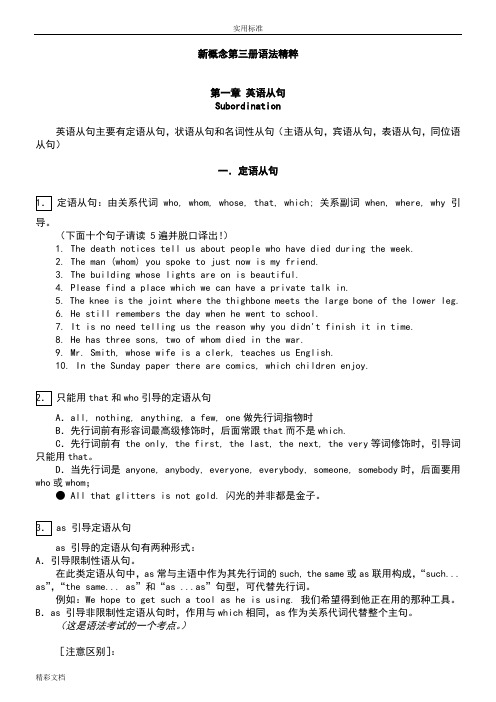
新概念第三册语法精粹第一章英语从句Subordination英语从句主要有定语从句,状语从句和名词性从句(主语从句,宾语从句,表语从句,同位语从句)一.定语从句定语从句:由关系代词 who, whom, whose, that, which; 关系副词 when, where, why 引导。
(下面十个句子请读 5遍并脱口译出!)1. The death notices tell us about people who have died during the week.2. The man (whom) you spoke to just now is my friend.3. The building whose lights are on is beautiful.4. Please find a place which we can have a private talk in.5. The knee is the joint where the thighbone meets the large bone of the lower leg.6. He still remembers the day when he went to school.7. It is no need telling us the reason why you didn't finish it in time.8. He has three sons, two of whom died in the war.9. Mr. Smith, whose wife is a clerk, teaches us English.10. In the Sunday paper there are comics, which children enjoy.只能用that和who引导的定语从句A.all, nothing, anything, a few, one做先行词指物时B.先行词前有形容词最高级修饰时,后面常跟that而不是which.C.先行词前有 the only, the first, the last, the next, the very等词修饰时,引导词只能用that。
名词性从句讲解课件

特点
which在从句中担任成分 ,通常表示“哪个”、“ 哪些”。
例子
I don't know which book you like best. (我 用法
定义
例子
whose是一个限定词,用于引导名词 性从句,表示某个对象的所属关系。
I don't know whose book this is. ( 我不知道这是谁的书。)
分类
01
02
03
04
主语从句
在句子中充当主语的名词性从 句,通常放在句子的开头。
宾语从句
在句子中充当宾语的名词性从 句,通常放在动词或介词之后
。
表语从句
在句子中充当表语的名词性从 句,通常放在系动词之后。
同位语从句
在句子中充当同位语的名词性 从句,通常放在名词之后,对
名词进行补充说明。
02 名词性从句的引导词
总结词
在名词性从句中,从句与主句的逻辑关系经常处理不当。
详细描述
应仔细分析从句与主句之间的逻辑关系,确保从句的内容与 主句的内容相符合,避免出现逻辑上的矛盾或混乱。
感谢您的观看
THANKS
定义
why是一个副词,用于引导名词性从句,表示某 个原因或动机。
特点
why在从句中担任成分,通常表示“为什么”、 “因为什么”。
3
例子
I don't know why he left early. (我不知道他为 什么提前离开了。)
03 名词性从句的时态和语态
时态:现在时、过去时、将来时
现在时
表示现在或将来某个时间点发生的动作或存在的 状态。
强调句型
总结词
突出强调某个成分
名词性从句讲解最全版ppt教学课件
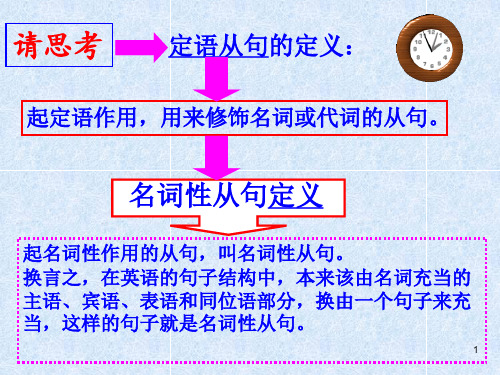
practical .
(宾语从句)
16
为深入学习习近平新时代中国特色社 会主义 思想和 党的十 九大精 神,贯彻 全国教 育大会 精神,充 分发挥 中小学 图书室 育人功 能
名词性从句引导词的用法(3):
连接代词
“whoever”-- “-----的任何人”、作主语、 “whomever”-- “-----的任何人”、作宾语、 “whatever”-- “----的任何东西”、作主表宾语、 “whichever”--- “无论哪个或哪些---”、作定语、
4、Could you tell me the question whether English is
useful for us now(. 同位语从句)
7
为深入学习习近平新时代中国特色社 会主义 思想和 党的十 九大精 神,贯彻 全国教 育大会 精神,充 分发挥 中小学 图书室 育人功 能
If与whether的区别:
17
为深入学习习近平新时代中国特色社 会主义 思想和 党的十 九大精 神,贯彻 全国教 育大会 精神,充 分发挥 中小学 图书室 育人功 能
“whoever”-- “---的任何人”、作主语、起连接作用
1、Whoever could solve the problem will be
rewarded .
(主语从句)
2、What he wants to ask you now is which team
won the game .
(表语从句)
3、Could you tell me which one is right .
(宾语从句)
15
为深入学习习近平新时代中国特色社 会主义 思想和 党的十 九大精 神,贯彻 全国教 育大会 精神,充 分发挥 中小学 图书室 育人功 能
名词性从句完整版课件

whose的用法
引导定语从句,不可省略。 在定语从句中,whose可以省略,也可以用其他词代替。
在非限制性定语从句中,whose可以省略整个定语从句。
THANK YOU
06
名词性从句的引导词
that的用法
引导主语从句、宾语从句、表语从句 ,不可省略。
在主语从句中,that不可省略,但可 以省略整个主语从句。
在宾语从句中,that有时可省略,但 为了不引起混淆,可以用其他词代替 。
what的用法
引导主语从句、宾语 从句、表语从句,不 可省略。
在主语从句中, what不可省略,但 可以省略整个主语从 句。
延期的命令已被球队收到)。
注意事项
注意事项一
同位语从句与定语从句的区别在 于,同位语从句是对名词或代词 进行解释或说明,而定语从句则
是对名词或代词进行修饰。
注意事项二
同位语从句的引导词that不能省略 ,但有时可以省略从句中的系动词 be。
注意事项三
同位语从句在句子中一般不用逗号 隔开,但有时为了强调同位语的内 容,可以用逗号隔开。
获奖的消息是真的)。
用法二
同位语从句也可以用来解释代词 ,如“He has no idea who the murderer is”(他不知道凶手
是谁)。
用法三
同位语从句还可以用来解释抽象 名词,如“The order that the
game be postponed was received by the team”(比赛
05
同位语从句
定义
同位语从句:同位语从句是名 词性从句的一种,用于对名词 或代词进行进一步的解释或说 明。
同位语从句通常由连词that引 导,有时也用whether、连接 代词或连接副词引导。
(完整版)新概念英语第3册课文解析
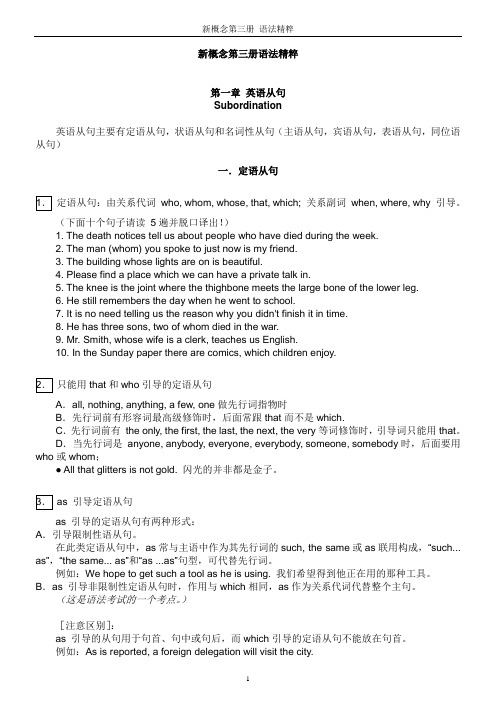
新概念第三册语法精粹第一章英语从句Subordination英语从句主要有定语从句,状语从句和名词性从句(主语从句,宾语从句,表语从句,同位语从句)一.定语从句定语从句:由关系代词who, whom, whose, that, which; 关系副词when, where, why 引导。
(下面十个句子请读5遍并脱口译出!)1. The death notices tell us about people who have died during the week.2. The man (whom) you spoke to just now is my friend.3. The building whose lights are on is beautiful.4. Please find a place which we can have a private talk in.5. The knee is the joint where the thighbone meets the large bone of the lower leg.6. He still remembers the day when he went to school.7. It is no need telling us the reason why you didn't finish it in time.8. He has three sons, two of whom died in the war.9. Mr. Smith, whose wife is a clerk, teaches us English.10. In the Sunday paper there are comics, which children enjoy.只能用that和who引导的定语从句A.all, nothing, anything, a few, one做先行词指物时B.先行词前有形容词最高级修饰时,后面常跟that而不是which.C.先行词前有the only, the first, the last, the next, the very等词修饰时,引导词只能用that。
雅思阅读语法7名词性从句(课堂PPT)

不可省略的连词: 1. 介词后的连词 2. 引导主语从句和同位语从句的连词不可省略。例如: That she was chosen made us very happy. 她被选上了,我们很高兴。 We heard the news that our team had won. 我们听到消息说我们队赢了。
12
翻译练习
【练1/3】中国教育的最大变化就是,已经有更多的人可以接受 教育。 (剑3,T1,S) 【练2/3】早上学的另一个好处是孩子在社交方面发展更快。 (剑4,G,TB,W) 【练3/3】我的观点是年轻人应该受到鼓励,去开阔视野。(剑5, T2,W)
(2)It + be +名词+ that-从句 It is common knowledge that the whale is not a fish. It's a pity that he should have catched the train.
(3) It + be + -ed分词 + that从句 It is said that he is a famous writer. It is reported that there will be a storm this afternoon.
3
一
主语从句 在复合句中充当主语的从句
东升求实学校教育通讯工作总结报告
Dongsheng Qiushi XueXiao Jiaoyu TongXun Gongzuo ZongJie
1.that引导主语从句
that引导主语从句时不同于其他的连词,既无词义也不作成分
,只起单纯的连接作用,且通常不可以省。为了强调that引导的
6
名词性从句思维导图

1。宾语从句一般用陈述语气,但是,当主句的谓语动词为advise,insist(坚决主张), suggest(建议), require,request, order,ask(要求)等表示请求、命令、要求、主张意义的动词时,从句谓语要用虚拟语气,即用“should+动词原形"(should往往可以省略)。
It has turned out that …结果是……
类似的不及物动词还有:seem,appear,occur,follow,happen, turn out, etc。
It turned out thatnobody remembered the address.
结果是无人记得那个地址。
It now appears thatthey are in urgent need of help。
陈述句变为宾语从句时,要注意人称和时态的变化,语序不变。
eg. She said,“I will leave a message on the desk."
→She saidshe would leave a message on the desk.
一般疑问句和特殊疑问句变为宾语从句时,也要注意人称和时态的变化,后面接陈述语序.
It has not been made clearwhen the new road is to be opened to traffic.还没弄清楚这条路将开始通车
(4)It +不及物动词+从句
It seems that …好像是……
It happened that…碰巧……
It follows that …由此可见……
特别强调:它的主语和谓语的语序是陈述语序,而不是疑问句的倒装结构。
Subordination

宾语从句 待续…. we never doubt that he is honest. she suggested that he do it at once. can you tell us who is responsible for the fire. Please explain why this is impossible. Nobody can tell when she will arrive.
1.限定从属分句之名词性分 句
• • • Note 在语法意义上 限制从属分句之名词性分句即名词性从句 Function 在句中作主语,宾语,主语补足语,同位语,介词补足语。 由that,who,whom,what,whatever which,whichever等连接 代词【注,在传统英语语法中有连接代词,连接副词和关系代词,关 系副词之分;连接代词和连接副词引导主语从句,表语从句或宾语从 句。关系代词和关系副词引导定语从句。现在语法中可不在分类,统 称为关系代词和关系副词】引导的 • △ 关系代词在句中既有连接作用 又做成分 • △关系副词在句中起双重作用,在句中即是连词又做状语 看下面例 子 主语从句 That she should be ungrateful cut him to the heart • Who will preside at the meeting has not been decided yet. • Which team has won the game is not known yet. • What he needs is more experience • Whoever it is ,I do not want to see him. • When can begin the expedition is still a question. • Wherever he once lived is well preserved.
基础英语写作chapter 3 (7,8)coordinationsubordination

– 地点(place ) 地点(place – where ,wherever – Where there is a will, there is a way. – 原因(reason) 原因(reason) – because since, as ,for . – As there is no answer, I wrote again.
宾语从句(Object Clause)
– I think (that) he is right.(由that引 right. that引 导) – I don’t believe what he said.由关 said. 系代词what what引导 系代词what引导 – Do you know where the post office is? 由连接副词引导) is?(由连接副词引导)
Different ways to subordonate second important idea – Put second important idea in subordonate clause. He would come to see me whenever he was in this city.
– It is true that she is an actress. actress. – I know that Phillips is a good make. make. – My idea is that we should plan. stick our plan. – My idea that we should stick our plan is right. – What I ’d really like is a d remote control.
(31) Subordination汇总
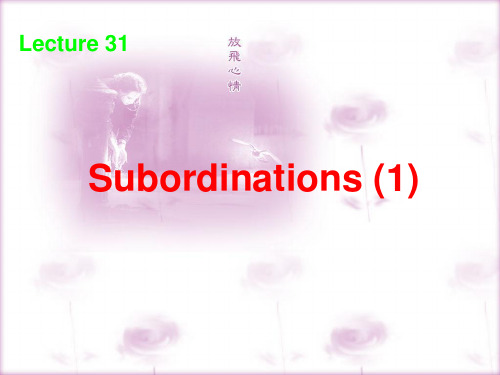
for the reason that (因为) due to the fact that (因为) by reason that (因为) on the grounds that (由于; 根据) in the sense that (在某种意义上或在某种程度上) in spite of the fact that (尽管) in the light of the fact that (鉴于; 由于; 按照, 根据) on account of the fact that (由于; 根据) regardless of the fact that (不管, 不顾)
Nominal clauses can function as subject, object, subject complement, appositive, and prepositional complementation.
(1) Subject Clause
e.g.: That she will refuse the offer seems unlikely.
It isWvheartyhliekedloyetshaist hoeftewnillaftavilaarigaanicneinwtihthewrahcaet.he says. It isWdhoeunbthfuel pwlhaentehetarksehseowffilhl abse naobtlebetoencoamnneo. unced. It hWashne’rtebteheenmmeaedtiengclewailrl bwehehneltdhehansenw’t rboeaednisdetocidbed. openWedhtoomtrafdfiec.the long distance call is not important. HaWs hiticbheetenafmouwndillowuitnwthheo mseattcthheisresctiollrdu?nknown. It isHobwvhioeuhsandoweswcahpicehdpislaunnisclebaert.ter. It wWahsectlheearr sehneo’sugchomwihnagt osrhenomt edaonets.n’t matter too mIt uischa.mystery to me how it all happened.
名词性从句课件

连接句子
通过使用名词性从句,可以将两个 或多个句子连接起来,形成一个逻 辑清晰、结构紧凑的段落或篇章。
简化句子
使用名词性从句可以简化句子的定义
总结词
表语从句是名词性从句的一种,用作 表语,补充说明主语的性质、状态或 身份等。
详细描述
表语从句紧跟在系动词(如be, seem, become等)之后,用于提供关于主 语的更多信息。它通常由that, whether, as, what等引导词引导,形 成复合句。
详细描述
主语从句是一个完整的句子,作 为主句的主语,表示主句所描述 的对象或主题。
用法
总结词
主语从句的用法主要有两种,一是直接将句子放在主语的位置,二是使用形式主 语it来代替。
详细描述
在英语语法中,主语从句可以直接放在主语的位置,例如:“What he said is true.”,也可以使用形式主语it来代替,例如:“It is obvious that he is guilty.”。
。
名词性从句与其他从句的区别
02
名词性从句与其他类型的从句在结构和功能上有明显的区别。
提高名词性从句运用能力的途径
03
多练习写作,掌握名词性从句的运用技巧,提高语言表达能力
。
THANKS
感谢观看
06
名词性从句的运用实例
句子结构分析
名词性从句在句子中的作用
名词性从句在句子中充当名词,可以作为主语、宾语、表语或同 位语。
判断名词性从句的方法
通过判断从句在句子中的功能和位置,可以确定是否为名词性从句 。
名词性从句的分类
名词性从句可以分为三大类,即陈述句、一般疑问句和特殊疑问句 。
语境理解
- 1、下载文档前请自行甄别文档内容的完整性,平台不提供额外的编辑、内容补充、找答案等附加服务。
- 2、"仅部分预览"的文档,不可在线预览部分如存在完整性等问题,可反馈申请退款(可完整预览的文档不适用该条件!)。
- 3、如文档侵犯您的权益,请联系客服反馈,我们会尽快为您处理(人工客服工作时间:9:00-18:30)。
Practice: 1. ____ she couldn’t understand was ____ fewer and fewer students showed interest in her lesson. A. What; why B. That; what C. What; because D. Why; that 2. Go and get your coat. It’s ___ you left it. A. there B. where C. there where D. where there
Practice: 用并列与/或从属手段将两个简单句连成一个句子。 1. I saw a film yesterday. The film was dull. 2. He didn’t get up early enough. He missed the train. 3. He had a sore throat. He had spoken for three hours. 4. Illness kept him away from home. He didn’t get the prize. 5. He came out of the Conference Room. Reporters surrounded him.
从属结构
eg. the man with a gun in hisn his hand Before she could answer the telephone, it stopped ringing. 从属连词:P346
1. Read P352-358, and then finish Exe. 31E. 2. Finish the left exercises of Chapter 31 as you like. 3. Preview Chapter 32.
3. _____ is a fact that English is being accepted as an international language. A. There B. This C. That D. It 4. There is a feeling in me ___ we’ll never know what a UFO is not ever. A. that B. which C. of which D. what 5. ____ leaves the room last ought to turn off the lights. A. Anyone B. The person C. Whoever D. Who
(b) 由wh-引导: eg. 由谁来负责这项事故尚未明了。 Who was responsible for the accident is not yet clear. 他什么时候回来取决于天气如何。 When he’ll be back depends much on the weather. 她是否回来于我无关。 Whether she comes or not doesn’t concern me. 他曾经住过的地方都保存完好。 Wherever he once lived is well preserved.
Chapter 31 Subordination (1)
从属结构(一)
并列与从属
Coordination & Subordination 区别:说话者的强调重点不同 eg. The rain stopped. The sun came out. 两者同等重要: → The rain stopped and the sun came out. “太阳出现”比较关注: → When the rain stopped, the sun came out.
Adverbial
Clause 状语分句:
时间状语分句 地点状语分句 方式状语分句 manner 原因状语分句 reason 结果状语分句 result 目的状语分句 purpose 条件状语分句 condition 让步状语分句 concession
关于状语分句的几点补充 (1) 时间状语: “一…就…”: Hardly/Scarcely/Barely…when… No sooner…than… eg. He arrived. Very soon he had to leave again. → He had hardly arrived when he had to leave again. → Hardly had he arrived when he had to leave again. → No sooner had he arrived than he had to leave again.
Subordinate
Construction 从属结构:
限定分句 (Chapter 31) 非限定分句 (Chapter 32) 无动词分句 (Chapter 32) 词组(主要是介词词组) eg. When the rain stopped, the sun came out. He ran up to her, breathing heavily. Bank loan or no bank loan, we’ll buy the house. The house at the end of the street was designed by Palladio.
•
The doctor got into the bed. Very soon he was called out again. → No sooner had the doctor got into the bed than he was called out again.
Assignment:
常常用it当形式宾语: eg. They kept it quiet that he was dead.
He has made it clear that he won’t agree to the plan. Why don’t you bring it to his attention that you’re too ill to go on working?
限定从属分句:
以限定动词词组作谓语动词的从属分句。 名词性分句 形容词性分句(关系分句) 副词性分句(状语分句)
Nominal Clause 名词性分句:
主语从句 宾语从句 表语(主补)从句 同位语从句
Subject Clause 主语从句
(a) 由that引导: eg. That she was elected monitor made us very happy. 常常用it作形式主语: It is quite clear that he is a liar. It is reported that a bank was robbed yesterday.
8. ---I drove to Zhuhai for the air show last week. ---Is that ___ you had a few days off? A. why B. when C. what D. where 9. Eat_____ cake you like and leave the others for_____ comes in late. A. any; who B. every; whoever C. whichever; whoever D. either; whoever
表语从句:
eg. The fact is that he didn’t notice the car until too late. The problem is not who will go but who will stay.
Appositive
clause 同位语从句:
eg. They had to face the fact that the nearest filling station is 30 miles away. We are discussing the problem whether the film is worth seeing.
Object Clause 宾语从句: eg. He suggested that I take driving lessons. (Exe. 31C on P526)
I doubt if / whether he can pass the exam. (否定)
You must give it back to whoever it belongs to.
10. ____ be sent to work there? A. Who do you suggest B. Who do you suggest that should C. Do you suggest who should D. Do you suggest whom should KEY: ABDAC BAACA
6. People have heard what the President had said; they are waiting to see_____ he will do. A. how B. what C. when D. that 7. ____ is no possibility ___ Bob can win the first prize in the match. A. There; that B. It; that C. There; whether D. It; whether
Hardly + had (过去完成体)… when… eg. The criminal found a shelter. Very soon he was caught by the policeman. → Hardly had the criminal found a shelter when he was caught by the policeman.
